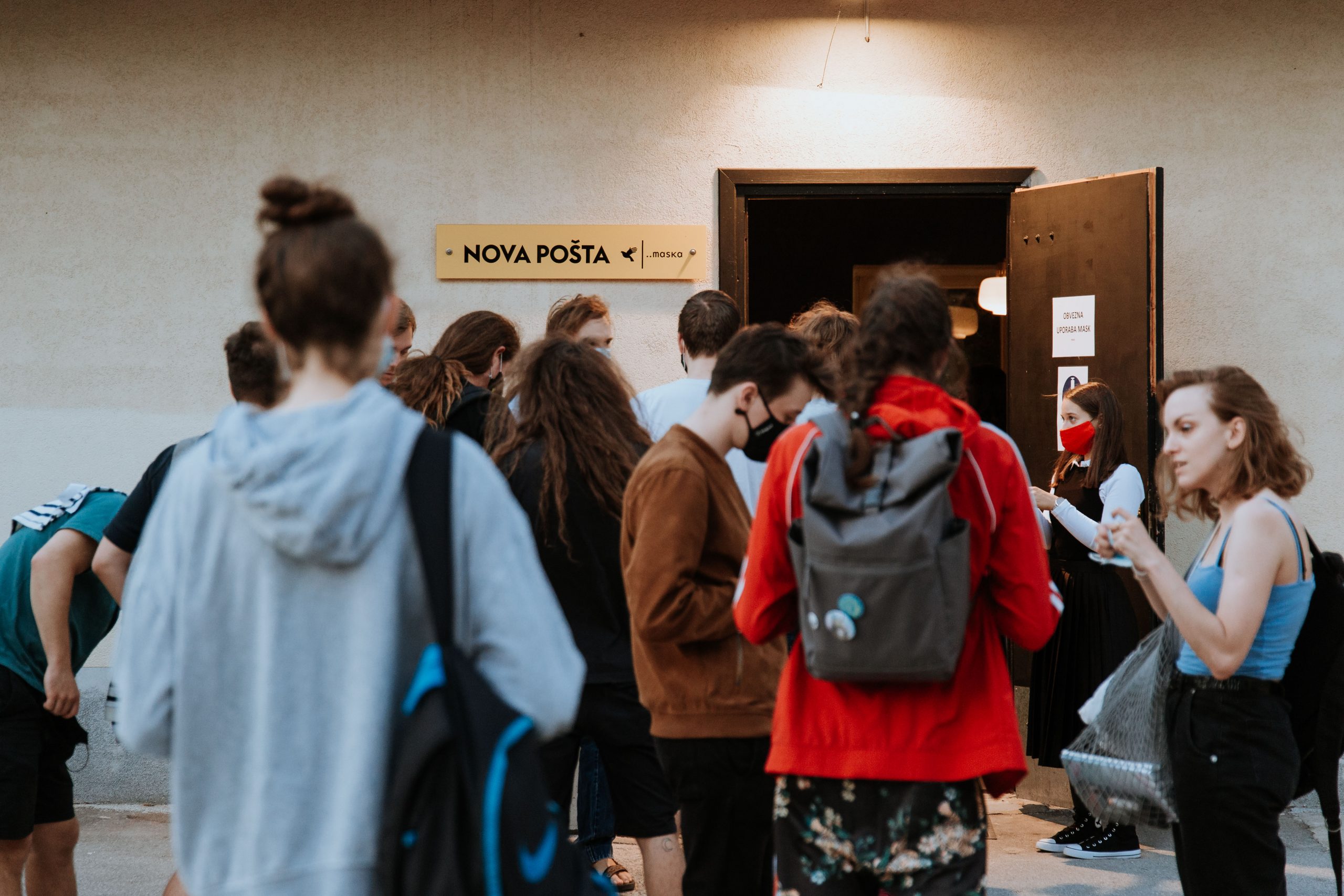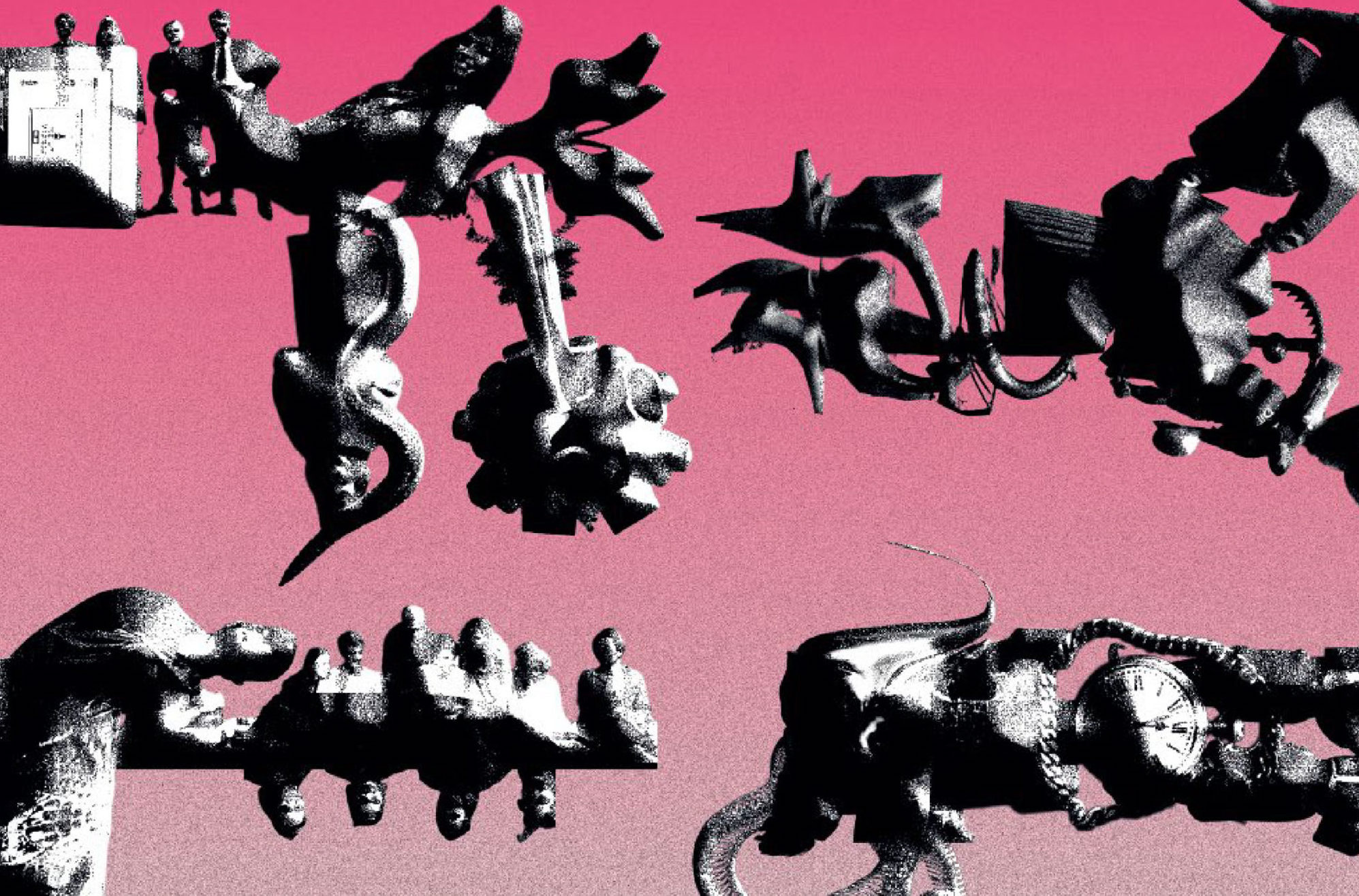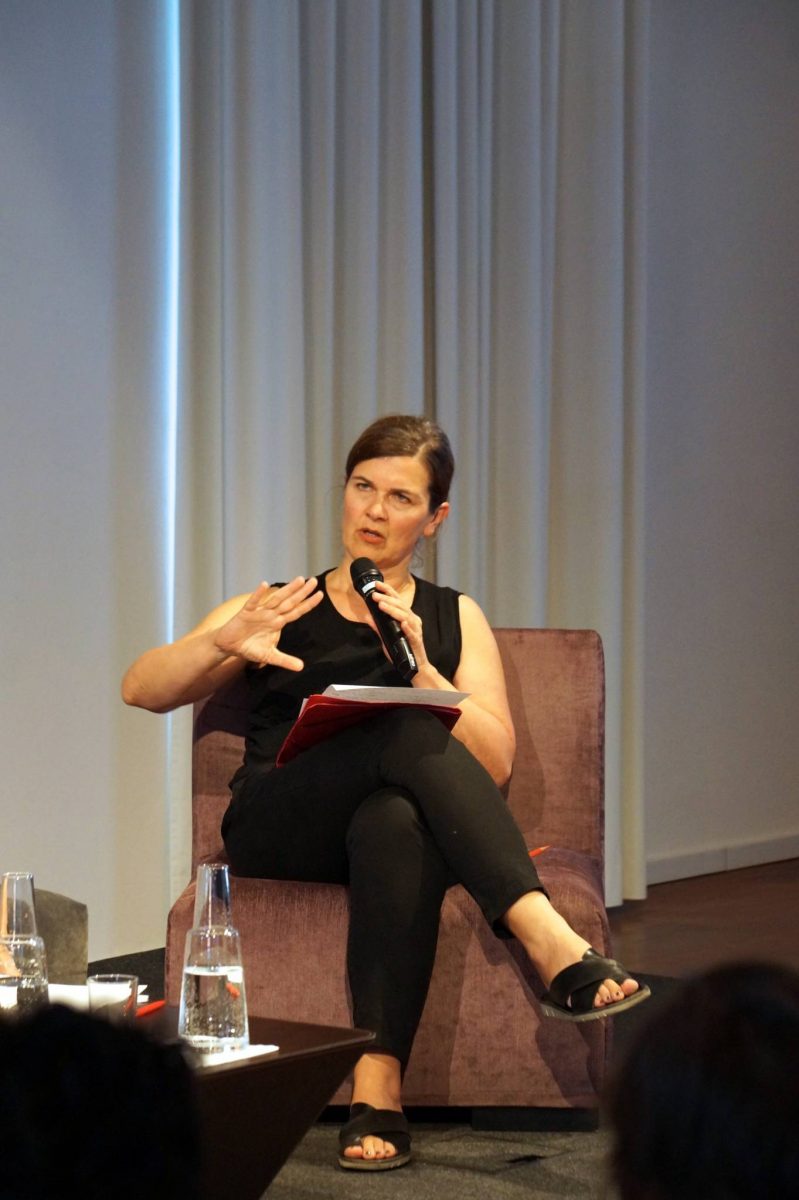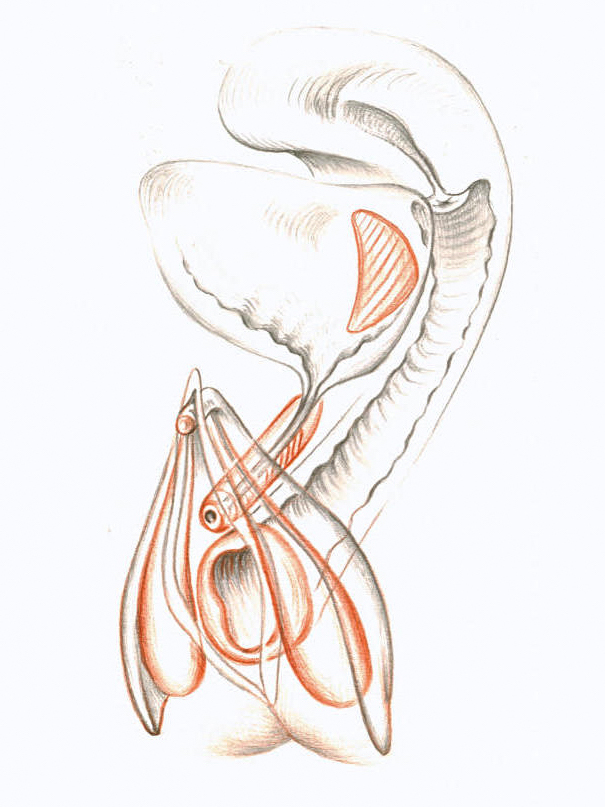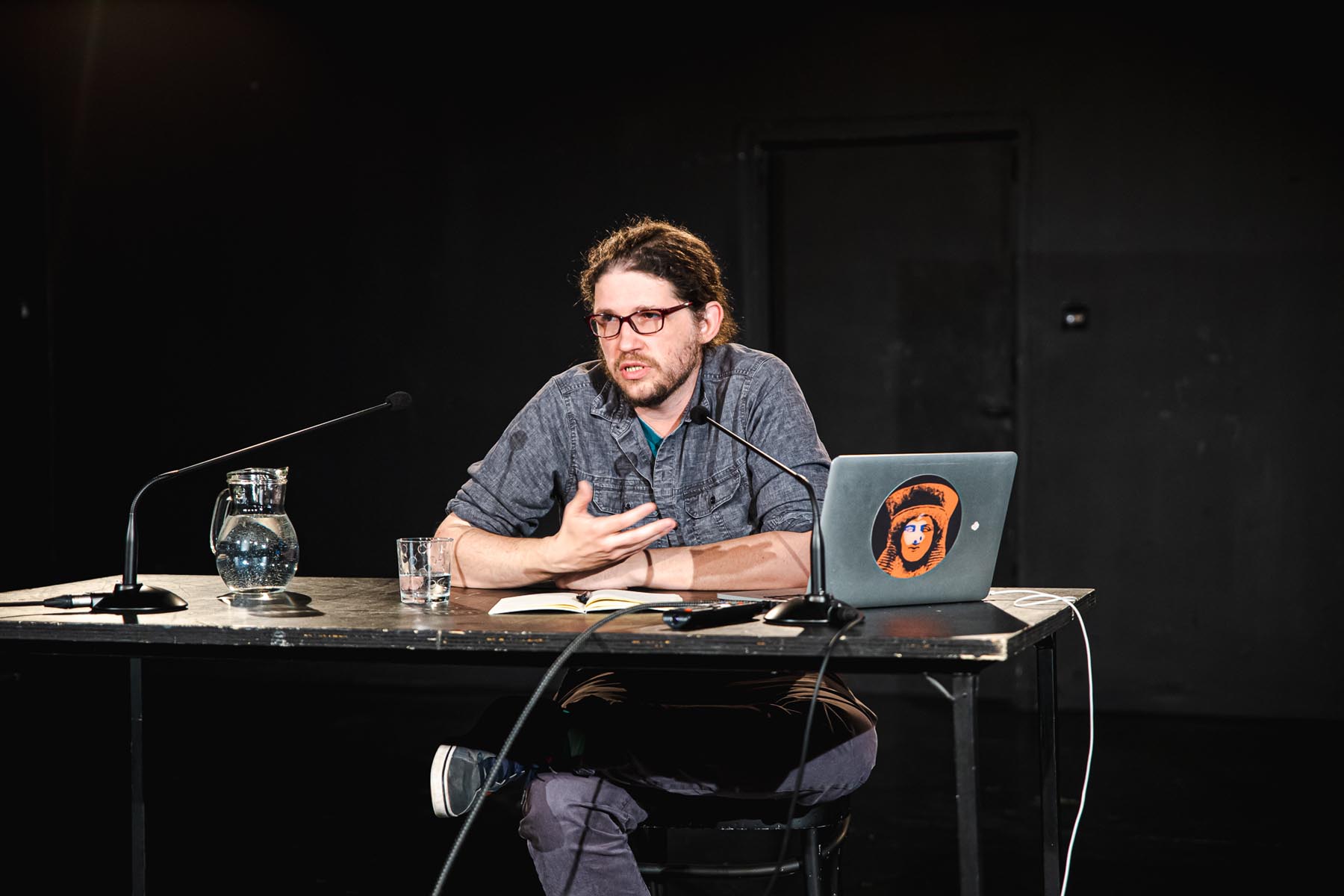Contemporary Performing Arts Seminar 2021-2022
Contemporary Performing Arts Seminar which will take place at The New Post Office in the season 2021–2022, is an informal educational and research platform, within which internationally renowned theoreticians, artists and writers present their lectures. Seminary has shaped many of the local artists, theoreticians and critics, who still operate today at the intersection between theory and art.
In the future, we would like to establish the seminar as a platform consisting of various educational formats, which would function as an independent programme unit within the Maska Institute, with its own curatorial scheme, but with topics and questions that are related to Maska Institute’s current artistic production. Various teaching formats have been established in the past especially under the guidance of Bojana Kunst, giving students a space for theoretical-artistic interventions or searching for completely new production units. The seminar will try to continue with this in mind, placing reading circles, writing workshops and theoretical-artistic interventions alongside the regular public lectures
Conceptual framework: Pia Brezavšček, Rok Bozovičar, Alja Lobnik, Aleš Mendiževec, Gregor Moder
PR: Urška Comino
Translations: Urban Belina
Design: Nika Lapkovski
Video: Vid Hajnšek
Head of production: Tina Dobnik
Technical director: Igor Remeta
Production: Maska Institute Ljubljana for The New Post Office
Fall Semester (September to November 2021) Fisher’s Problem: Is there (Still) No Alternative?
The allure of Mark Fisher’s social-critical theory may be found in his rare virtue of being crystal clear about what bothers him and what attracts him, of exposing in a completely honest theoretical way what he himself sees as the problem: capitalist realism, or the question: ‘Is there no alternative?’ The issue is not a new one, but it is raised in a new and honest way. Depressive hedonism, corporatism of desire, love of bureaucracy, reflexive impotence, fluid present and historical amnesia… so many symptoms or reasons why we cannot even raise the question of an alternative to capitalism. The autumn part of the Seminar will ask this question again and again, revolving around Fisher’s issue and confronting it in different ways, trying to find traces of an alternative.
The fall semester will start in September with a lecture by Matt Colquhoun. Matt Colquhoun edited Mark Fisher’s posthumously published book Postcapitalist Desire: The Final Lectures of Mark Fisher and in 2020 published his own book Egress: On Mourning, Melancholy and Mark Fisher; he is also the author of the blog xenogothic, and writes on various topics such as photography, contemporary popular music, accelerationism, counterculture, etc.
For the Seminar he will give a lecture on Fisher’s theoretical development from his first book Capitalist Realism, a translation of which was recently published by the Maska Institute, to his last, unpublished and unfinished essay Acid Communism, which was to serve as a preface to his new book, as well as on the theoretical nuances, digressions, and unrealised possibilities that Fisher’s work left us with. The lecture will be followed by a discussion with the author about why Fisher is so relevant today, what makes him a special thinker, what social critical theory meant to him and why he did it differently, and in what way – what precisely is the charm of Mark Fisher.
The lecture series continues with Lea Kuhar. Lea Kuhar has a PhD in Philosophy. Between 2016 and 2020 she worked as a young researcher at the Institute of Philosophy of the Research Centre of the Slovenian Academy of Sciences and Arts (ZRC SAZU). In 2020, she completed her PhD thesis at the ZRC SAZU Postgraduate School. In her research, she focuses on Marxism, epistemology and contemporary political philosophy. She is a member of the Programme Board of the Institute for Labour Studies, editor of the journal Borec and author of several scientific articles published in national and international journals.
In her lecture, Lea Kuhar will talk about the melancholy of the left and ressentiment as an alternative to capitalist realism: Mark Fisher regards capitalist realism as the widespread feeling that the capitalist mode of production is the best of all possible worlds, which, by its specific economic-political mode of operation, makes it impossible for potential opponents to try to conceive of an alternative to it. In this lecture we will analyse two affects of the left positions which we will argue are dominant today, namely melancholy and ressentiment. Because of their specific modus operandi, left-wing melancholy and ressentiment seem at first sight to be anti-social, reactionary and even apolitical, which is why they are not usually considered as progressive or revolutionary. To counter this understanding, we will argue that melancholy and ressentiment can also be understood as the beginnings of the possibility of the emergence of an alternative to capitalist realism.
The September series continues with Ana Reberc. Ana Reberc is a critical psychologist and sociologist of culture. She has been working as a reporter and researcher at Radio Študent and radio editor of the Psychoteka segment since 2017. In 2021, she completed her Master’s degree in Sociology of Culture with the title Ideološke predpostavke psihologije. (Ideological Assumptions of Psychology). Her main research interests are critical psychology and Marxist feminism.
The lecture focuses on the alienation of the human being, which is progressively becoming more and more fatal in capitalist society, which is reflected in human consciousness as well. Adorno wrote in 1950 that the mechanism of the subject’s adaptation to the aggravated relations is the mechanism of its hardening. The more we conform to capitalist realism, the more we become a thing, the less we live and are at the mercy of the nothingness of depression. With the help of Mark Fisher, in this lecture we will try to imagine depression as a socially situated response to reality and in this re-conceptualisation we will look for ways of our emancipation.
At the end of September, there will be an ‘intermezzo’ event, which could most simply be entitled ‘Mark Fisher and Contemporary Music’. In his second book, Ghosts of My Life, Fisher spoke of ‘hauntology’, an empty present that merely imitates historical phenomena in a nostalgic way, without any real relation to them, even without irony. Nevertheless, Fisher finds the rare exceptions that create art out of this emptiness – he locates them in pop culture, where his reflections on music stand out the most. On Burial and the melancholy of his electronic music, on Caretaker and his sonic representation of amnesia, etc. But Fisher is somewhat subjective in his selection, so this short series of lectures will try to find the zeitgeist and traces of alternative in contemporary music in a similar manner. The speakers will be Muanis Sinanović, Nina Hlebec, Jaša Bužinel and Robert Bobnič. The event will be followed by a DJ set by Drone Emoji ‘based on the motifs of Mark Fisher’.
In October, we will continue with a lecture by Vesna Pobežin Roš. Vesna Pobežin Roš obtained her PhD in 2015 with her dissertation entitled Ideologija, avtoriteta in subjekt v konstituciji pedagoškega polja (Ideology, Authority and Subject in the Constitution of the Pedagogical Field) at the Department of Philosophy of the Faculty of Arts in Ljubljana, under the supervision of Prof Mladen Dolar. Her main theoretical interests are psychoanalysis, upbringing and education. She was the initiator of the expert meeting The Other of Pedagogical Discourse and edited the eponymous proceedings in collaboration with the Institute of Pedagogy. Her book Pedagoška ideologija ali Kdo zdaj tu uživa? (Pedagogical Ideology or Who’s Enjoying This Now?) was published by the Association for Theoretical Psychoanalysis.
The lecture highlights the context of critical reflection on contemporary education, where for some time now the intrusion of entrepreneurial, managerial and neoliberal logics and terminology into the field of education, university studies and academic work has been problematised. In a similar context, also Fisher highlights the progressive bureaucratisation that is one of the most prominent features of the field of education throughout its entire vertical. But besides the questions of what ‘optimisation of work processes’, ‘profit’, ‘quality’ and similar terms mean to us when we use them in the field of teaching, besides the questions of the usefulness of checking for bureaucratic diligence, which is what most school inspection activities are based on, it is equally reasonable to raise the question of ‘teacher competence’ – what is that supposed to be today? So, what is it that teachers are supposed to possess in order to meet the almost mystical ideal of a good school? Last but not least, who are the contributors to the imaginary that defines the contemporary pedagogical field? The lecture will try to outline the conceptual and phantasmatic pool that feeds a current which is complementary to the aspect of ‘managerialisation’ and which can be called the pedagogisation of society, and how it can be linked to Fisher’s description of depressive hedonism.
The last lecture in the series will be given by Varja Hrvatin, Maša Radi Buh and Jakob Ribič, who since 2018 have been the writers and co-creators of the Territory of Theatre segment on Radio Študent, which ranges from professional and theoretical contributions to collaged interviews and live broadcasts on a specific topic. In their collective work, they are interested in combining their individual specificities and personal areas of interest, as their shared knowledge and experience create a dynamic insight into the diverse layers of the performing arts. By combining philosophical, theatrological and sociological perspectives, they decode theory with practice, think about practice with theory, and bring the performing arts closer to broader or more peripheral issues of society.
The lecture will focus on a critical presentation of the prevailing ideology that today convinces us that mental health problems are a matter of the individual, not of the environment in which they live and work – according to the modern ideology of ‘working on oneself all the time’, relieving psychological distress becomes the duty of the individual. Each person has to fend for themselves, without considering the dominant form of labour and the narrower system of relations in which it takes place. It appears that the most characteristic of artistic activity are those ways of working that cause the most stress and psychological distress for the individual (constant flexibility, mobility, precariousness, permanent instability, equating work and life, etc.). Today, the artist seems to be the ideal form of the contemporary worker. This is why we will be interested in the possibility of a correlation between the degree of mental distress and the prevailing forms of the artist’s work, related not to the nature of the work (vulnerability, working with one’s own emotions and psychic content, the connection to the intimate, etc.) but to the social, economic and ideological context in which the work takes place.
In parallel with the Seminar, in September and October there will be a reading circle on Fisher’s Capitalist Realism, in cooperation with the Cultural-Artistic Association Anarhiv and the Charter of Democratic Students (LDŠ). The LDS is an association that focuses its activities on revitalising the field of student politics and challenging the trend of privatisation at the university. The Association is more of a movement than a rigid organisation, and seeks to continuously question and reflect on student interest and to promote it in the form of various calls, responses, projects and trainings – including the Political School of Contemporary Political Thought. Cultural and Artistic Association Anarhiv, which is an extension of the Elf’s Reading Room project (where the circle is planned to take place), is an association that aims to provide young people (especially students) with access to an extremely diverse range of minority material, related to emancipatory social movements, either on the activist or theoretical level. Kud Anarhiv also helped to publish the translation of Fisher’s Capitalist Realism.
September to December 2021 Neodvisni: Theatre Review Writing Seminar
At a time when art criticism is trying to somehow find its way in both the reduced space and the dwindling time for reflection, Neodvisni are setting up a seminar on theatre review writing. It is not merely about expanding the discourse on art, bringing artistic practices and professional reflection closer to the public, nor is it (only) about education – the basic aim of the seminar is to provide space and time for critical reflection, and at the same time to work practically against the established image of criticism as a solitary pursuit.
Seminar meetings will take place twice monthly (September to December) and activities include group visits of performances, discussions on ways of seeing and writing, guided reflective practice and the publication of contributions on the Neodvisni portal.
The seminar, which will take place in the framework of the Maska Institute Seminar 2021–2022, will be led by Rok Bozovičar, co-editor of the Neodvisni portal and Maska journal. For more information, please contact rokbozovicar@gmail.com. The seminar is made possible by the Ministry of Culture’s 2021 Working Grant for the self-employed in culture.
Spring Semester (March to May 2022) Non-Human Stakeholders
The theatre was created as a platform for the enactment of human values, of human relations to the Gods and, above all, to other human beings. But this humanist self-reliance proved insufficient, because while we were preoccupied with ourselves, the environment rebelled and, during the last pandemic, halted theatres entirely materially, not only in representation. Recent turns in ontological orientation have brought about a renewed focus on the material, especially in the so-called new materialisms and materialist (eco)feminisms.
The spring semester of the Seminar will therefore be devoted to this turn of events and to ways of taking ‘things’ seriously: ‘Rather than a dilution of agency as applied to humans, new materialist agency invites us to consider how non-human bodies or matters might contribute to their own actualization, or demand a response’. (Neimanis, ‘Thinking with Matter Rethinking Irigaray: A “Liquid Ground” for a Planetary Feminism’)
These topics are also intertwined with the production of the Maska Institute, as the climate collapse resulting from human unbridled exploitation of natural resources is the subject of the performance Fever, the latest piece by director Žiga Divjak.
The pre-launch event will take place in October 2021 for the first run of Žiga Divjak’s Fever. The lecture will be given by Andreas Malm, Associate Professor of Ecology at Lund University and author of How to Blow up a Pipeline in Fossil Capital: The Rise of Steam Power and the Roots of Global Warming, which received the prestigious Isaac Award. Malm is also a member of the editorial board of the Historical Materialism scientific journal.
In this guest lecture, Andreas Malm will base his argument on the fact of the climate crisis – it is no longer a dilemma whether there is a crisis or not, it is also clear who is causing it and who is the main opponent of the political movement that is resisting the worsening of the climate crisis. But why are resistance movements, which are growing in number and scale, still not successful? The question becomes even more pressing when we include the problem of violence in these theoretical and political debates: how can we justify violence in political insurgencies, and is it necessary? What are the limits of violence and why are we being too passive? Malm’s lecture will seek to address these issues and to uncover the potentials of the protagonists of the counter-insurgency movements themselves, who are confronting the worsening climate crisis.
Next, Martina Ruhsam will visit us in the spring. Martina Ruhsam is a teaching and research assistant in the MA programme at the Choreography and Performance (CUP) at the Justus-Liebig University Giessen, Germany and author or co-author of numerous performances and events. She worked in the theoretical department of the Tanzquartier in Vienna and was a member of the editorial board of the online journal for dance, choreography and performance, Corpus. She is the author of Kollaborative Praxis: Choreographie (Turia + Kant, 2011). In 2020, she completed her PhD with the dissertation ‘Moving Matter. Non-Human Bodies in Contemporary Choreographies’.
In her guest lecture Martina Ruhsam will talk about non-human agents in contemporary choreographic practices. She will analyse the parallels and differences between object-oriented theories, new materialisms and artistic practices in the performing arts that involve non-human stakeholders. In addition, she will reflect on how artistic works can contribute to the debate on political ecology.
The second guest of the spring semester is Ben Woodard. Ben Woodard is an independent scholar working and living in Germany. His work focuses on the relationship between naturalism and idealism during the long nineteenth century. His book Schelling’s Naturalism was recently published by Edinburgh University Press.
In his lecture, Ben Woodard will focus on the intersection of ecology and biology from a contemporary philosophical position. He will question the relationship between human and non-human nature, emphasizing the latter’s autonomy without it becoming an alibi for socio-political abuses. During Woodard’s visit, we plan to conduct a short workshop under his guidance.
Upcoming
New publications of Maska publishing house 2021–2022
Bojana Kunst: Življenje umetnosti: prečne črte skrbi (The Life of Art: Transversal Lines of Care);
Gal Kirn: Partizanski protiarhiv: O umetniških in spominskih prelomih jugoslovanskega NOB (Partisan Counter-Archive: On the Artistic and Commemorative Breakpoints of the Yugoslav National Liberation Struggle)
Mateja Kurir (ed.): Oblast v arhitekturi (Power in Architecture) with contributions by Mladen Dolar, Andrej Benjamin and others.
New issues of Maska journal 2021–2022
Voice and Choreography, vol. XXXVI, No.: 203/204, Autumn 2021, Editors: Pia Brezavšček and Rok Bozovičar. Guest editor: Jasmina Založnik.
Episodes of illness, vol. XXXVI, No.: 205/206, Winter 2021, Editors: Pia Brezavšček and Rok Bozovičar.
Police and Performance, vol. XXXVII, No.: 207/208, Spring 2022, Editors: Pia Brezavšček and Rok Bozovičar. Guest editor: Andrej Mirčev.
Yugofuturist Manifesto, vol. XXXVII, No.: 209/210, Summer 2022, Editors: Pia Brezavšček and Rok Bozovičar.
